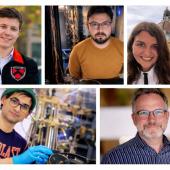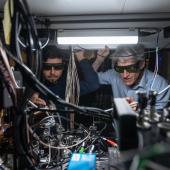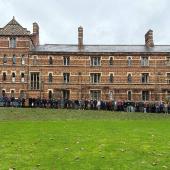Information is physical, and at the microscopic level the world is quantum; we study how quantum-mechanical systems store and manipulate information. Our research includes both seeking fundamental insights, as well as exploiting these phenomena to build quantum computers.
Quantum computers operate in a fundamentally different way than conventional computers, which allows them to solve certain problems substantially faster than classical computers. Quantum computers store and process information encoded in quantum superpositions (the information is in multiple states simultaneously) and ‘entangled’ states, in which the information in different quantum bits is correlated in a way that is impossible in classical physics. It is anticipated that such computers will have a dramatic impact on the world once realised.
The Quantum Computing via Integrated and Interconnected Implementations (QCI3) hub, part of the UK's national programme to develop quantum technologies, is the third successive hub to be led out of Oxford's Department of Physics. It follows on from the UK Quantum Computing and Simulation (QCS) hub and the Networked Quantum Information Technologies (NQIT) hub. QCI3 brings together leading UK academic and industry partners to tackle key challenges and accelerate progress in quantum computing.
Theoretical quantum information
The quantum systems engineering group theoretically studies quantum optical platforms including ultracold atoms, ion traps, and cavities as well as quantum materials whose non-equilibrium dynamics can be controlled by ultrafast optics.
The frontiers of quantum physics group investigates quantum physics beyond the microscopic domain. We use techniques from information theory, thermodynamics and many-body physics to bridge the gap between the micro and macro worlds.
The theory of quantum systems group develops new implementations and applications of quantum computing and simulation, using techniques from quantum optics and quantum many-body physics, and working closely with experimental teams.
Quantum hardware
The trapped ion quantum computing group uses individual atomic ions as quantum bits (qubits) for quantum computing, quantum sensing, and precision spectroscopy.
The superconducting quantum devices group uses superconducting electric circuits to study quantum mechanical effects, and as highly flexible ‘engineerableʼ platform to develop innovative approaches to quantum computing.
The NMR quantum computing group works on the implementation of quantum information processing using nuclear magnetic resonance and closely related techniques.



